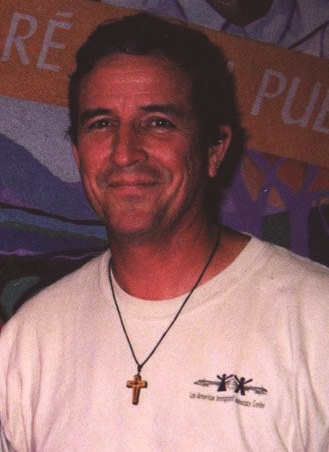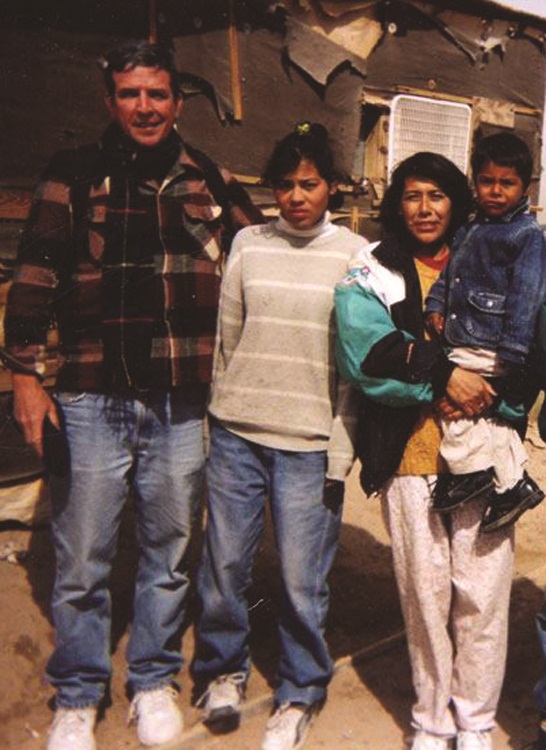A Change Of Plan

Father Bill Morton, from Philadelphia, USA, was an air traffic controller. But for several years now he has been on mission in El Paso on the Mexican/US border as a Columban missionary priest. In this interview, he tells us how that happened.
Q: What’s your family background?
Father Bill: I was born into a large Catholic family in Philadelphia in 1952. Frequent discussion about faith, politics and social issues around the dinner table, regular attendance at Sunday Mass and recitation of the family rosary were buttressed by lived values of hospitality to anyone who came to our door. After high school, I enlisted in the Navy and qualified as an air traffic controller.
Q: Was it a stressful job?
Father Bill: At times. On one occasion when I was in training at the Pensacola Naval Air Station in Florida I cleared a plane on to the main runway when all of a sudden an A-7 from the aircraft carrier USS Lexington requested an emergency landing. I had to clear him to land on the crosswind runway and as he touched down I saw him bounce on one tire, which burst, and then bounce back on the other wheel and that tire burst as well. The plane spun off the runway into the dirt. My heart was in my mouth. The canopy popped open and, thank God, the pilot was OK.
Q: Was your religion important to you during those years?

Father Bill: As a young man of 18, in a new place without the influences of family and community, I began to drift. I rarely went to Mass and seldom thought about God. I went to bars and nightclubs, drank and smoked heavily and experimented with drugs. At the same time, a man named Jim in my air traffic control unit used to speak to me about Christ, leave little pamphlets in my mailbox and invite me to go to his church.
Life in the fast lane was leaving me empty and longing for something and so I began to attend church and eventually had a conversion experience. I told my parents I had become ‘Born Again’ and was no longer a Roman Catholic. When I went home on vacation there was friction in the family over my ‘conversion’. My father said, ‘You’re no “Born Again” Christian; you are a fallen-away Catholic!’ They invited a well-known religious woman to the house and together tried to convince me to return to the fold. They were all seated in the living room and I at the top of the stairs armed with my Dake’s Concordance, an evangelical book designed to refute Catholic doctrine.
Q: Were their efforts to convince you successful?
Father Bill: No. Back in Pensacola I became even more involved in the Church of the Open Bible. We worked with the youth and started a Christian coffee house and a Jesus rock group. I would pick up the teenagers in my Volkswagen minibus for Sunday services and for our Friday night coffee house called ‘Freedom Road’.
It was a kind of hippie type thing, a very casual atmosphere where we mixed music with scripture and preaching. We invited the kids to accept Jesus and receive counsel about family, drug and other problems. It was a joyful and creative time for me and it deepened my sense of mission.
Q: How do you look back on those years?
Father Bill: I have remained friends with Jim, who witnessed to me, and I still delight in telling him I would not have become a Catholic missionary priest without that profound experience in the evangelical church. Through it I developed a more personal relationship with Christ and an appreciation of the Scriptures. I overcame my Catholic reticence to share faith and I developed a much more outgoing approach.
Q: What then brought you back to the Catholic Church?
Father Bill: Though I agreed with and experienced personally this relationship with Jesus, certain behaviors like smoking, drinking and swearing were stressed as litmus tests of Christian life. There was a lot of quoting of Scripture and arguments about who was saved and who was not. I began to think of the Catholics I knew who didn’t quote much Scripture, who smoked or drank, but who were also generous, compassionate and non-judgmental people.
I asked myself, ‘If Jesus came back whose butt would he be kicking?’ I concluded that it would more likely be my own, because of my self-righteousness, rather than the man on the street with his bottle.
I was madly in love with one of the girls who sang in our Christian rock group. She had been raised Protestant and one day asked if we could go to a Catholic Mass. We went to a Saturday evening Mass at St Mary’s and it was a lively celebration with guitars and songs and a young Irish priest who preached with fervor and humor. Though still very much a member of the Church of the Open Bible I had a fleeting ‘I could do that’ thought about the priest.
My girlfriend enjoyed the visit and so we began to go each Saturday evening and then to the Open Bible on Sunday morning.
My mother had also written me a very challenging letter, quoting John 6, and asking me how those who claim to interpret the Bible literally understand the Eucharist. I didn’t have any convincing answers and began to hunger to receive Holy Communion again in the Catholic way.
Though I had always disliked confession as a youth, I began to long to hear those words of pardon and absolution and finally made up my mind to seek out a priest. Around this time my girlfriend suggested that we break off for a while to get things into perspective. This upset me at first but thoughts of priesthood and mission continued to float around in my head.
Q: Why did that happen?
Father Bill: My process of conversion was liberating me spiritually, psychologically and socially.
I had always wanted to fit in, to be liked by others. Now I began to live out what I perceived as the values of Christ, living from within whether others liked it or not. I was becoming the person I had been created to be.
Mission came from my desire to have others share this freedom and joy that God had given me. A year or more before I came back to the Catholic Church I saw a Columban ad in the Navy Times newspaper. It simply said, ‘I bribe you with uncertainty and I challenge you with defeat.’ I cut it out and put it in my wallet although I’d never heard of the Columbans.
Later, when I returned to full communion with the Church I wrote to the Columbans enquiring about the missionary priesthood. When I told my evangelical friends about this emerging call some were very upset. It was a painful experience to break with people who had become close friends.
Q: After your ordination as a Columban priest in 1985 you were assigned to Taiwan. Was that another drastic change of culture and outlook?
Father Bill: During my years of formation and early priesthood, I had changed from being a Protestant fundamentalist to a Catholic fundamentalist. I was always prepared to argue, to prove what was true from Scripture or Church teaching.
Assigned to Taiwan I discovered that the people in general thought there was no difference between Catholics, Protestants, Mormons or any of the other groups. I saw how the Holy Spirit could work also outside of any Christian church. One example was the great kindness of my friend’s mother when I became ill. Mrs Chen didn’t know me well and wasn’t a Catholic. In the mornings I would see her offering incense to the Chinese gods of the sky and the mountains. Her charity and hospitality to a stranger, a foreigner, made me think the Spirit was here and working.
Many of my certainties about life and religion were shaken-up and I had to reconstruct my way of seeing things. Cross-cultural experience deepened my conversion.
Q: Now you work on the US/Mexican border. What are you doing there?
Father Bill: If Taiwan challenged me to reshape what was going on in my head, the poverty that I saw in Juarez and on the US/Mexican border forced me to look at what was going on in my heart. I wanted to offer service to those people. I felt the need to become involved, to be in solidarity instead of just talking or writing.
